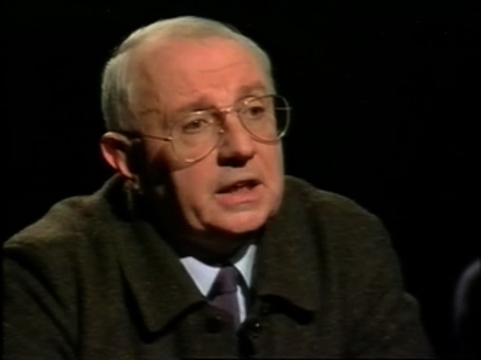Search results for 'virilio'
Paul Virilio
Paul Virilio (b. 1932 in Paris) is a world-renowned philosopher,
urbanist, and cultural theorist. His work focuses on urban spaces and
the development of technology in relation to power and speed. He is
known for his coining of the term 'dromology' to explain his theory of
speed and technology. Paul Virilio is of mixed ancestry, being the son
of an Italian father (who identified as a Communist) and a Breton
mother. As a small child in France during the Second World War, Paul
Virilio was profoundly impacted by the blitzkrieg and total war;
however, these early experiences shaped his understanding of the
movement and speed which structures modern society. In order to escape
the heavy fighting in the city, he fled with his family to the port of
Nantes in 1939.
Unknown Quantity - Foreword
"Contemporary civilization differs in one particularly distinctive feature from those which preceded it: speed. The change has come about within a generation," noted the historian Marc Bloch, writing in the nineteen-thirties. This situation brings in its wake a second feature: the accident. The progressive spread of catastrophic events do not just affect current reality, but produce anxiety and anguish for coming generations.
ReadSpeed and Information: Cyberspace Alarm!
The twin phenomena of immediacy and of instantaneity are presently oneof the most pressing problems confronting political and militarystrategists alike. Real time now prevails above both real space and thegeosphere. The primacy of real time, of immediacy, over and above spaceand surface is a ~fait accompli~ and has inaugural value (ushers a newepoch). Something nicely conjured up in a (French) advertisementpraising cellular phones with the words: "Planet Earth has never beenthis small". This is a very dramatic moment in our relation with theworld and for our vision of the world.
ReadDie Informationsbombe
Ausgestrahlt im Deutsch-Franzoesischen Kulturkanal ARTE November 1995.
In den fuenfziger Jahren hat Albert Einstein gesagt, dass wir es mitdrei Bomben zu tun haetten. Die erste, die Atombombe, sei bereitsgezuendet. Die zweite sei die Informatikbombe; die dritte, dieBevoelkerungsbombe, werde im 21. Jahrhundert explodieren. Gegenwaertigexplodiert die Informatikbombe. Neue Technologien, insbesondere dieMoeglichenkeiten zur Schaffung virtueller Welten, veraendern Kultur,Politik und Gesellschaft grundlegend. Zu diesem Thema diskutieren heuteabend im Gespraech der Stadtplaner und Philosoph Paul Virilio undFriedrich Kittler, Medienspezialist an der Humboldt Universitaet inBerlin.
N5M Zapbook - Table of Contents
Working Papers for The Next 5 Minutes
Conference, Exhibition and TV Program on Tactical Television
Amsterdam, October, 1992
Edited by Amsterdam Cultural Studies
(Jeroen van Bergeijk, Geke van Dijk, Karel Koch, Bas Raijmakers)
Strategies for Tactical Media
Conscious of the growing involvement of artists in political protest through their art and the utilisation of conventional and digital media technologies, RealTime's editors approached media theorist McKenzie Wark to comment on where he sees Tactical Media fitting in the bigger picture of power and media.
ReadPostscript on the Societies of Control
1. Historical
Foucault located the disciplinary societies in the eighteenth and nineteenth centuries; they reach their height at the outset of the twentieth. They initiate the organization of vast spaces of enclosure. The individual never ceases passing from one closed environment to another, each having its own laws: first the family; then the school ("you are no longer in your family"); then the barracks ("you are no longer at school"); then the factory; from time to time the hospital; possibly the prison, the preeminent instance of the enclosed environment. It's the prison that serves as the analogical model: at the sight of some laborers, the heroine of Rossellini's Europa '51 could exclaim, "I thought I was seeing convicts."
Media Without an Audience
Presence in the mediated environment of digital networks is probably one of the most complex phenomena of the new types of social interaction that have emerged in these environments. In the current phase of radical deployment (or penetration) of the Internet, various attempts are being made to come to terms with the social dynamics of networked communication spaces. It seems that traditional media theory is not able to contextualise these social dynamics, as it remains stuck on a meta-level discourse of media and power structures (Virilio), hyperreality (Baudrillard), or on a retrograde analysis of media structures deeply rooted in the functionality and structural characteristics of broadcast media (McLuhan).
ReadGrundrisse einer Netzkritik
1. Toward a European Standard Code for Critical Interchange (ESCCI)
Bezeichnen wir das Internet einfach einmal als 'Kind der Moderne', soist das klassische Genre der Kritik sicherlich ein Teil davon. Im nochandauernden Zeitalter des multikulturellen Massenkonformismus, vollerMikropraxis und Ich-Management, ist die Kunst der Kritik jedoch inVergessenheit geraten. Die hiesigen Kommentare zielen nur noch aufKorrektur von Verhaltensweisen ab. Die Meinungsmacher/innen haben allesAngebotene laengst hinter sich, sie sehen das Ganze wirklichdifferenziert, aus sicherem Abstand. Die glueckliche Tatsache, man seieben nicht engagiert, wird als persoenliche Errungenschaft gefeiert.Solche talking heads ohne Eigenschaften sind aber nutzlos in Zeitenrascher Entwicklungen, sowie das beim Wachstum der Computernetze imMoment der Fall ist.
Minor Media Normality in the East
1. Autogenerative Europe
In our imagination, eastern Europe was always black and white. Traveling to East Germany or Poland meant suddenly leaving colorful western Europe and entering a movie from the forties or fifties. Later we simply couldn't remember having seen any color, not the green of the trees, nor the red of the brick buildings. When we went to the movies to see a film by Wajda, Kieslowski or Tarkowsky, the filmmaker's experiments with color only reinforced our image of the east as gray. Europe clearly had an ideologically motivated neurosis when it came to the perception of color.
Wikileaks and Freedom, Autonomy and Sovereignty in the cloud
"We have to be very attentive and united at a state level to fight
against what is a threat to democratic authority and sovereignty,"
-
French government spokesman Francois Baroin speaking out against
wikileaks releasing US diplomatic cables.
"Governments of the
Industrial World, you weary giants of flesh and steel, I come from
Cyberspace, the new home of Mind. On behalf of the future, I ask you of
the past to leave us alone. You are not welcome among us. You have no
sovereignty where we gather."
- A Declaration of the Independence of
Cyberspace, John Perry Barlow
Transfiguration of the Avant-Garde
The Negative Dialectics of the Net
In his essay, "Presenting the Unpresentable: The Sublime", Jean-François Lyotard observes that capitalism, technoscience and the pictorial avant-garde of the twentieth century share an 'affinity to infinity'. All three point towards a sensibility that is constitutive for the experience of the modern world.
Some points of departure
Introductory essay for the second editon of the Next 5 Minutes festival of tactical media, 1996.



